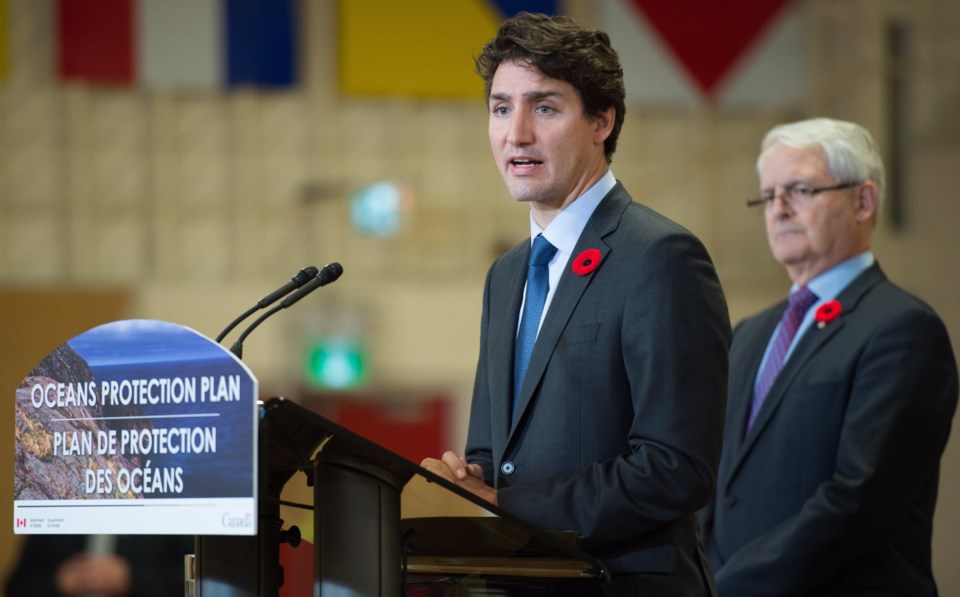Premier Christy Clark says a $1.5-billion ocean-protection plan announced by Prime Minister Justin Trudeau Monday answers the province’s spill-response concerns.
The endorsement could mean a hurdle crossed for Kinder Morgan’s proposed Trans Mountain pipeline expansion, to the consternation of environmentalists who say no amount of response planning will prevent a devastating spill.
“We’ve been cheated by the federal government for decades when it comes to adequate spill response,” Clark said. “I’m really gratified to say the federal responses we saw today address the gaps that we’ve identified. I look forward to finalizing the details.”
Although the federal announcement was vague in commitments, Clark said she expects it will bridge 11 gaps the province has identified to create a “world-class” spill response system.
They include banning northern tanker traffic, adding three new salvage rescue tugs estimated to cost up to $50 million each and a fully functioning Canadian Coast Guard station in Prince Rupert.
She said that her approval of the plan does not necessarily mean a “yes” from the province on Trans Mountain.
Trudeau said the new funding over five years is “the most significant investment ever made to protect our oceans.”
It includes creating a marine safety system, restoring marine ecosystems, and spending on oil spill cleanup research and methods in the Pacific, Atlantic and Arctic environments.
“The ongoing incident at Bella Bella is unacceptable … it’s time for a change,” Trudeau said, referring to a tug running aground last month and the sinking of a barge on Sunday.
The prime minister said the funding will strengthen the Canadian Coast Guard, crack down on industrial pollution, fund coastal habitat restoration and create new legislation to increase responsibility for vessel owners.
A federal decision on the $6.8-billion Trans Mountain project is expected by Dec. 19.
Former MP David Anderson, who represented lower Vancouver Island for 17 years, said it was surprising the federal announcement made no specific mention of the province’s conditions.
“Clearly they were on different pages of different songbooks,” Anderson said. “I’m puzzling over it. It suggests there isn’t a current agreement to proceed with Kinder Morgan.”
It may have been a strategic move by the province to release its specific demands, he said, ahead of federal approval for the project.
“I suspect that the province is trying to create a separate division, where it may in fact say: ‘Well, we didn’t approve it, we asked for more.’ And the feds will be left — and this is assuming that they do approve it — with the sole responsibility,” Anderson said.
Trudeau is between a rock and a hard place, with Alberta threatening to pull co-operation on climate-change commitments if it doesn’t get a pipeline to the coast that would allow for expansion of oilsands production, he said.
Environmentalists applauded the new funding, but said it shouldn’t allow increased tanker traffic. Caitlyn Vernon, Victoria-based campaigns director for the Sierra Club of B.C., stood with dozens of protesters in the rain outside HMCS Discovery, where Trudeau made the announcement.
“The measures announced today are definitely needed and welcome. But it’s important to point out that having a bigger mop doesn’t reduce the chance of a spill,” Vernon said.
The Dogwood Initiative said the federal funding appears to set the stage for increased tanker traffic, through federal approval for Trans Mountain.
The announcement came a day after a barge flipped and sank, not far from the site on B.C.'s central coast where a tug ran aground last month, spilling more than 100,000 litres of diesel fuel from its tanks. “These incidents show the only effective way to deal with an oil spill at sea is to prevent it from happening in the first place,” communications director Kai Nagata said in a statement.
— With The Canadian Press



